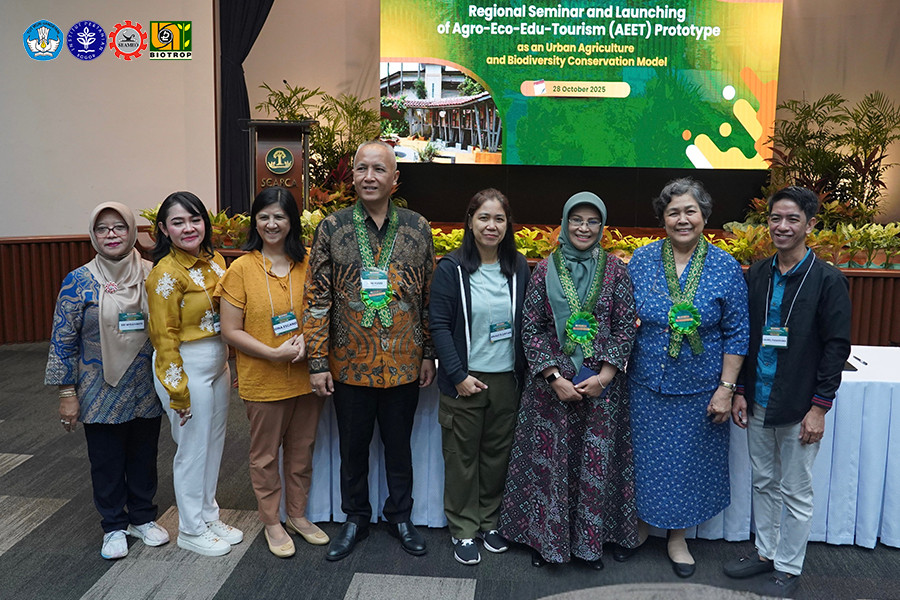Los Baños, Philippines, 28 October 2025 — The Southeast Asian Regional Centre for Tropical Biology (SEAMEO BIOTROP), in collaboration with the Southeast Asian Regional Center for Graduate Study and Research in Agriculture (SEAMEO SEARCA), officially launched the Agro-Eco Edu-Tourism (AEET) Prototype at SEARCA’s headquarters in Los Baños, Laguna. The activity formed part of a regional seminar attended by more than 2,000 onsite and online participants representing schools, government institutions, and SEAMEO Centres across Southeast Asia and other partner countries.
In her welcome remarks, SEARCA Director Dr. Mercedita Sombilla emphasized that AEET “reimagines education not as a static transfer of knowledge, but as a dynamic, nature-based experience connecting learners to farming, ecology, and community.” She commended SEAMEO BIOTROP’s pioneering implementation of the model in Indonesia, where school gardens have evolved into living laboratories for biodiversity and agri-entrepreneurship, and cited its successful contextualization in Malaysia and Brunei as examples of AEET’s regional adaptability and alignment with the ASEAN Ecotourism Standard (2025).
Representing SEAMEO BIOTROP, Deputy Director for Administration Dr. Elis Rosdiawati conveyed appreciation for SEARCA’s leadership and collaboration with the University of the Philippines Los Baños (UPLB) and the Philippines Department of Education. She described the launch as “a celebration of shared vision and concrete action toward sustainable urban agriculture and biodiversity conservation across Southeast Asia.”
BIOTROP’s Human Center and Innovation Manager Ms. Dewi Suryani Oktavia presented the program overview, highlighting that AEET was first conceptualized in 2022 to integrate agriculture, ecology, education, and tourism into a single experiential learning framework. The Philippine prototype, localized through SEARCA’s Sky Garden, features soil-based and soilless cultivation systems, edible landscaping, and biodiversity-friendly designs that demonstrate how schools and communities can contribute to food security, environmental stewardship, and digital-based learning.
The regional seminar featured four resource presentations from distinguished experts. Dr. Doni Yusri, Deputy Director for Program of SEAMEO BIOTROP, discussed The Implementation of Agro-Eco Edu-Tourism in Indonesia as an Educational Model for Conservation, sharing experiences from AEET sites in Bogor. Prof. Dr. Darlina Md. Naim of Universiti Sains Malaysia presented The Implementation of AEET in Malaysia as an Educational Model for Conservation, highlighting community-based biodiversity education. For. Roberto Cereno, former Vice Chancellor for Community Affairs of UPLB, delivered Learning Through Nature: PASEO as a Platform for Science and Community-Based Ecotourism, while Mr. Carl Vincent Gapasin, National Program Head Coordinator of the Department of Agriculture’s National Urban and Peri-Urban Agriculture Program, discussed Scaling Up Urban and Peri-Urban Agriculture in the Philippines.
The event concluded with the signing of a Memorandum of Understanding between SEAMEO BIOTROP and SEAMEO SEARCA to further strengthen cooperation on urban farming, biodiversity education, and teacher capacity building. Dr. Rosdiawati expressed optimism that the AEET initiative will continue to expand across Southeast Asia and inspire more innovation toward a greener and more resilient region.
Developed under SEAMEO BIOTROP’s 11th Five-Year Development Plan (2025–2030), the Agro-Eco Edu-Tourism program advances biodiversity-based learning and community empowerment in support of the Centre’s regional mandate to promote sustainable agriculture, conservation, and transformative education in the tropics.
 Friday, 31 October 2025 on 2:06pm
Friday, 31 October 2025 on 2:06pm